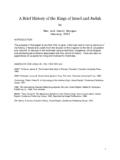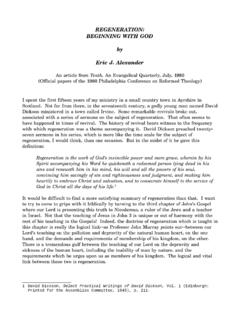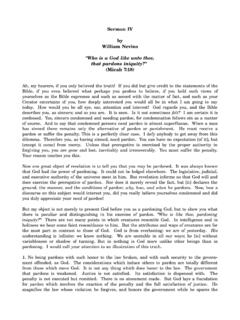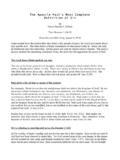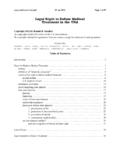Transcription of THE ORIGIN AND NATURE OF SIN - …
1 THE ORIGIN AND NATUREOF SINbyJ. Oliver Buswell, Oliver Buswell, Jr., Dean of the Graduate Faculty at Covenant College andSeminary, St. Louis, Missouri, received his general and theological education at theUniversity of Minnesota ( , 1917), the University of Chicago ( , 1924),McCormick Theological Seminary ( , 1923), Dallas Theological Seminary ( ,1927), Houghton College ( , 1936), New York University ( , 1949). He isthe author of Problems in the Prayer Life, The Philosophies of Tennant andJohn Dewey, Thomas and the Bible, and Being and Knowing: An Introduction toPhilosophy, among other Carl F.
2 H. Henry, ed., Basic Christian Doctrines (Grand Rapids: Baker BookHouse, 1971)."When He comes He will convict the world of sin.." This was Jesus' promise as he told of theministry of the Holy Spirit. The world of our day is strangely unconvicted, unconvinced, andunconcerned, yet where Spirit filled men faithfully present the Spirit inspired Word of God,conviction of sin comes. The great need of the world today is for consecrated channels for theconvicting work of the Holy Spirit. Only so can there be a genuine turning to the Lord andacceptance of the NATURE OF SINT here is very wide divergence of opinion among philosophers as to the criterion of what ought, orought not, to be.
3 Thus, when it comes to the question of what is good and what is evil, we comeacross several major schools of Christian answer is that God has given us the sense of oughtness, and that he has revealedthe criterion and the substance of what is good and what is evil. The mere fact that we have asense of what ought or ought not to be, a sense quite different from the sense of pleasure ordesire, is inexplicable on a merely naturalistic basis. Let us turn then to the Christian view."Sin is any want [lack] of conformity unto or transgression of the law of God." These words fromthe Westminster Shorter Catechism are based upon I John 3:4, "missing the mark [that is, wantof conformity] is breaking the law.
4 "1 The biblical view of sin, however, does not depend whollyupon the concept of law, for the biblical writers appeal to the holy character of God as the basis ofthe law. "Ye shall be holy for I, Jehovah, your God, am holy"2 is the constant presupposition. Itwas the revelation of the holy character of God3 which caused Isaiah to recognize his own sinfulcorruption. Thus, sin is not only violation of the divine law, which is an expression of God's will;1 Bible quotations, when not from the King James Version, are the author's own 19 6 profoundly, it is violation of the expression of God's holy character. It is corruption of thegoodness which the Creator originally imparted to his creatures; and, especially, it is thecorruption of the godliness with which God originally endowed man when he created him in hisown divine character is expressed by the divine will in the divine law.
5 Christians generallyunderstand that the Ten Commandments and the law of love4 constitute a brief summary ofGod's holy moral law for man. And this is all based upon God's holy may then be defined ultimately as anything in the creature which does not express, or whichis contrary to, the holy character of the ORIGIN OF SINThe ORIGIN of human sin, according to the Bible, is very simply ascribed to the willful self corruption of the creature under temptation. The record is given in the third chapter of Genesis,and the fact of the original human sin is expounded in Romans 5:12 21 and to the account of Genesis 3, man was created with a holy NATURE , in fellowship withGod, and placed in an environment which was "all very good"; but man was tempted to sin by apersonal being of another kind, or order, who had previously sinned against God.
6 This factindicates that the record of the original sin of man is not intended as an account of the absoluteorigin of sin in the record of the original human sin is of more value to us because this sin was induced by thetempter. Aside from the doctrine that Adam was our representative, the "federal" head of thehuman race, and we, representatively, sinned in him, the fact is that in our common experiencesin is induced by previous sin. We are in Adam and individually guilty and corrupt sinners; butno human being has brought about the absolute ORIGIN of sin in the universe. We must thereforesearch for the ORIGIN of sin in the tempter in the Genesis record is an evil personal intelligence.
7 The words "the Serpent," Isuggest, should be read as a proper The Genesis account has nothing to say about abiological reptile. "The Serpent" is not said to be one of the "beasts of the field" but to be moresubtle than any of them,6 and destined for a greater curse than Snakes do not literally eatdirt,8 but to be prostrated and to eat dust constitute an ancient metaphor for the humiliation ofan enemy. There is no natural antipathy between human beings and snakes,9 not as much asbetween humans and insects. Children have to be taught to avoid poisonous reptiles. The wholemeaning of the "enmity" of verse 15 is the enmity between "the Serpent" and the promisedRedeemer.
8 "The Serpent" is Satan, and figures throughout the Bible as the archenemy of Godand man, the instigator of all kinds of does the Bible say about the primeval ORIGIN of sin, before the fall of man? There is4Cf. Exod. 20:1-17 and Luke 1 Isa. 65:25 and Rev. 12:9, where the "Serpent" is a 3 3 3:14; Isa. 65 3 indication in the Bible that mankind is not the only order of created personal beingsamong whom sin has become an actuality. In Jude, verse 6, there is reference to "the angels thatdid not keep their own realm [arche] but left their proper dwelling." The parallel verse, II Peter2:4, speaks of "the angels that sinned.
9 " The biblical writers assume that Satan is the chief of thefallen angels. In I John 3:8 we read, "the devil sins from the beginning." From I Timothy 3:6 itis suggested that Satan's root or basic sin was pride. The words of Jesus are more explicit: "He[the devil] was a murderer from the beginning. He did not take his stand in the truth. [This isevident] because truth is not in him. When he speaks falsehood he speaks out of his own things,for he is a falsifier and the father of falsehood."10 Jesus' statement that the devil is, from the beginning, a murderer and a falsifier is probablybased upon the fact that by falsehood Satan brought about the fall of man, in which man (1)became liable to physical death, (2) became liable to eternal punishment, "the second death," and(3) became spiritually dead, that is, alienated from fellowship with are expositors who hold that, aside from the rather clear references given above to the fallof Satan, the prophetic denunciations of Babylon11 and of the king of Tyre12 contain references toSatan's original status and his fall.
10 It is not unreasonable to hold that certain sentences in theseprophecies may contain analogies which would throw light upon Satan's probable original statusand his statements are not very full, yet the biblical account of the primeval ORIGIN of sin is clearenough: sin first became actual in an order of personal beings who are not a They do nothave racial solidarity or racial representative responsibility. This order of beings, presumablyhaving fully adequate understanding of the holy character of God and of God's impartation of hisholy character to his creatures, was endowed with the power of ethical spiritual choice.
